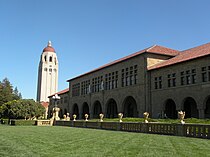
Back Huver institutu Azerbaijani Институт „Хувър“ Bulgarian Institut Hoover Catalan Hooverův institut Czech Hoover Institution Danish Hoover Institution German Institucio Hoover Esperanto Hoover Institution Spanish نهاد هوور Persian Hoover-instituutti Finnish
 | |
 The Hoover Institution in May 2014 | |
| Abbreviation | Hoover |
|---|---|
| Formation | June 1919 |
| Founder | Herbert Hoover |
| Type | Public policy think tank |
| Legal status | 501(c)(3) public charity |
| Purpose | Public policy research in economics, history, and national security. |
Professional title | The Hoover Institution on War, Revolution, and Peace |
| Location |
|
| Coordinates | 37°26′N 122°10′W / 37.43°N 122.17°W |
Director | Condoleezza Rice |
Parent organization | Stanford University |
| Subsidiaries | Hoover Institution Press Hoover Institution Library and Archives Uncommon Knowledge Battlegrounds Defining Ideas Hoover Digest |
Revenue (2023) | $104.6 million[1] |
| Expenses (2023) | $93.2 million[1] |
| Endowment | $782 million |
| Award(s) | National Humanities Medal |
| Website | www |
Formerly called | Hoover War Collection |
| This article is part of a series on |
| Conservatism in the United States |
|---|
 |
The Hoover Institution (officially The Hoover Institution on War, Revolution, and Peace) is an American public policy think tank which promotes personal and economic liberty, free enterprise, and limited government.[2][3][4] While the institution is formally a unit of Stanford University, it maintains an independent board of overseers and relies on its own income and donations.[5][6][7] It is widely described as conservative, although its directors have contested the idea that it is partisan.[3][2][5][8][9]
The institution began in 1919 as a library founded by Stanford alumnus Herbert Hoover prior to his presidency in order to house his archives gathered during the Great War.[10] The well-known Hoover Tower was built to house the archives, then known as the Hoover War Collection (now the Hoover Institution Library and Archives), and contained material related to World War I, World War II, and other global events. The collection was renamed and transformed into a research institution ("think tank") during the mid-20th century. Its mission, as described by Herbert Hoover in 1959, is "to recall the voice of experience against the making of war, and by the study of these records and their publication, to recall man's endeavors to make and preserve peace, and to sustain for America the safeguards of the American way of life."[11]
It has staffed numerous jobs in Washington for Republican presidents from Richard Nixon to Donald Trump.[12] It has provided work for people who previously had important government jobs. Notable Hoover fellows and alumni include Nobel Prize laureates Henry Kissinger, Milton Friedman, and Gary Becker; economist Thomas Sowell; scholars Niall Ferguson and Richard Epstein; former Speaker of the House of Representatives Newt Gingrich; and former Secretary of Defense James N. Mattis. In 2020, former Secretary of State Condoleezza Rice became the institution's director. It divides its fellows into separate research teams to work on various subjects, including Economic Policy, History, Education, and Law.[13] It publishes research by its own university press, the Hoover Institution Press.[14]
In 2021, Hoover was ranked as the 10th most influential think tank in the world by Academic Influence.[15] It was ranked 22nd on the "Top Think Tanks in United States" and 1st on the "Top Think Tanks to Look Out For" lists of the Think Tanks and Civil Societies Program that same year.[16]
- ^ a b "Annual Report 2023" (PDF). Hoover Institution. Retrieved February 14, 2024.
- ^ a b Hanson, Victor Davis (July 30, 2019). "100 Years of the Hoover Institution". National Review. Retrieved August 13, 2020.
- ^ a b "Hoover Institution on War, Revolution and Peace". Encyclopaedica Britannica. Retrieved April 16, 2015.
- ^ McBride, Stewart (May 28, 1975). "Hoover Institution: Leaning to the right". Christian Science Monitor. Retrieved April 16, 2015.
- ^ a b Cite error: The named reference
:0was invoked but never defined (see the help page). - ^ "Board of Overseers". Hoover Institution. Retrieved June 21, 2022.
- ^ Ali, Ayaan Hirsi. "The False Appeal Of Socialism". Hoover Institution. Archived from the original on October 5, 2023. Retrieved October 5, 2023.
- ^ Chesley, Kate (January 29, 2021). "Stanford's relationship to the Hoover Institution highlights Faculty Senate discussion". Stanford Report.
- ^ Gilligan, Thomas W. (March 23, 2015). "Business Dean Seizes Rare Opportunity to Lead Hoover Institution, and Other News About People". The Chronicle of Higher Education.
- ^ "Exhibits A through Z". Stanford Magazine. March 2006. Retrieved July 9, 2022.
- ^ "Mission/History". Hoover Institution. Retrieved June 20, 2022.
- ^ Val Burris. "The interlock structure of the policy-planning network and the right turn in U.S. state policy" In Politics and Public Policy (March 2015) pp. 3-42.
- ^ "Research". Hoover Institution. Retrieved June 20, 2022.
- ^ "Hoover Institution Press". Hoover Institution. Retrieved May 21, 2023.
- ^ "Top Influential Think Tanks". Retrieved October 9, 2020.
- ^ McGann, James (January 28, 2021). "2020 Global Go To Think Tank Index Report". TTCSP Global Go to Think Tank Index Reports (18).
© MMXXIII Rich X Search. We shall prevail. All rights reserved. Rich X Search